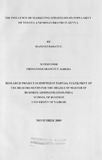| dc.description.abstract | The environment under which organizations operate is often rapidly changing and is being
shaped by several forces such as globalization, deregulation, technology advancement and
privatization. As a result of these forces the customer is now empowered with more
information and has a wide range of choices. Customers are also growing more sophisticated,
price sensitive, are short of time, want more convenience and have high service expectations.
To survive in a dynamic environment companies have to adapt their strategies to focus on
their customers and deal with emerging environmental challenges.
In Kenya, the motor vehicle industry is very competitive more especially when it comes to
selling small saloon cars of the Toyota and Nissan brands. The intensive competition in the
industry has seen motor dealers in Kenya spend millions of shillings on marketing in order to
get customers' attention, which hopefully lead to market penetration and dominance. There is
stiff competition for the leading motor dealers in Kenya as indicated in the Kenya Motor
Industry sales statistics.
TOYOTA and NISSAN brands are presumed to be similar in terms of product features and
technology. Both are manufactured in Japan. The companies appear to sell similar models.
They are sold and serviced by well established companies which target similar market
segments. These two brands appear to be quite popular in Kenya and are used in different
categories of motor vehicles be it brand new from the showroom or directly imported as
reconditioned from Japan commonly referred to as 'mtumba'.
It was therefore found professionally important to empirically investigate what makes these
two brands popular among the Kenyan customers and what brand positions the companies
have created to make them appeal to customers. The research studied the Toyota and Nissan
brands. The specific objectives of the study were to determine which company's brands are
more popular to corporate buyers in Kenya and to assess the extent to which the applied
marketing strategies influence the brand's popularity.
The study used a descriptive survey research design. The target population for the study was
composed of corporate customers of Toyota and DT Dobie in Kenya and the staff of these two
companies. The target respondents from the corporate customers were the Chief Executive
Officers, Marketing & Sales, Transport, Finance Managers and drivers. These are the key
influences of and / or decision makers on the design and make of motor vehicle brand to be bought.
The study mainly relied on primary data collected using partially structured questionnaires. The
questionnaires targeted respondents from the sampled corporate customers and staff from the
two companies (DT Dobie and Toyota East Africa). Data analysis involved computation of
measures of central tendency (mean score, frequencies and percentages) and dispersion (range,
variance and standard deviation). Where appropriate bar graphs were used to more clearly
present the study results.
The results of the study showed that the two marketing companies use various marketing
strategies to increase customer awareness of their brands and market shares. The strategies
that are mainly used by the two motor vehicle marketing companies are distribution,
promotion and pricing strategies. Toyota East Africa uses various tactics under these strategies
more often than DT Dobie for its Nissan brand. This accounts for the high popularity of the
Toyota brand than the Nissan brand in the Kenyan market.
On the issue of customer preference and use of the two brands in the Kenyan market 37% of
the respondents mentioned that they use Toyota brand only, and 27% indicated they only use
Nissan brand. Another 37% of the respondents mentioned that they have both the Toyota and
the Nissan brands.
Further research IS recommended to include other geographical regions as well as retail
customers. | en |

